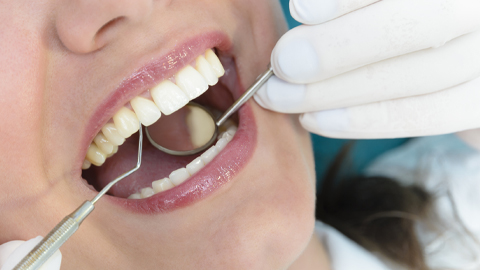Study suggests statins could help fight gum disease
Could taking statins benefit your mouth in addition to your arteries? A new study conducted in cell cultures showed that cholesterol-lowering drugs help to dampen the inflammation associated with periodontal disease by altering the behavior of macrophages, a type of immune cell.
Statins are the most common type of prescription medication in the United States today, taken by over 40 million Americans to lower cholesterol. The study suggests these drugs improve gum health and reduce the risk of heart disease.

Subramanya Pandruvada, an assistant professor in the College of Dental Medicine at the Medical University of South Carolina, oversaw the work.
“During our study, we replicated specific conditions in periodontal disease and demonstrated that introducing statins to our in vitro model modifies macrophage response,” Pandruvada said. “This allowed us to explore how medication like statins can help us treat inflammatory conditions such as periodontal disease.”
Pandruvada will present the new research at Discover BMB, the annual meeting of the American Society for Biochemistry and Molecular Biology, which is being held March 23–26 in San Antonio. The study’s lead authors are Waleed Alkakhan, a graduate dental resident in periodontology, and Nico Farrar, a dental student at the Medical University of South Carolina.
Periodontal disease occurs when the growth of bacteria in the gums causes the immune system to mount an inflammatory response, contributing to symptoms such as swelling, bleeding and bone degradation. Untreated, it can lead to tooth loss. Nearly half of adults over age 30 have some form of periodontal disease, according to the U.S. Centers for Disease Control and Prevention.
Current treatments for advanced periodontal disease include antibiotics, deep cleanings of tooth and root surfaces, and various surgical procedures. Researchers have sought new ways to calm gum disease through less invasive treatment strategies.
Some previous studies have shown that people taking statins tend to show fewer signs of periodontitis than people who do not take statins. The new study is the first to trace the biochemical pathways through which statins appear to reduce periodontal inflammation.
“Recent periodontal literature has shown the beneficial effects of statins when used with traditional periodontal therapy,” Pandruvada said. “However, our study highlights a novel approach in which statins affect macrophages specifically, which, through this mechanism, can help treat periodontal disease.”
Macrophages play an important role in helping the body fight infections; however, they can also worsen inflammation depending on the form they take at different phases of the immune response. The researchers grew macrophages and gum cells together for the study and exposed them to various conditions. They found that exposure to simvastatin, a common statin drug, suppressed the macrophage inflammatory response.
As a next step, the researchers plan to study the impacts of statins on periodontal disease in animal models, a step toward determining whether this strategy might be a safe and effective approach for future periodontal therapies.
The new findings build upon the group’s initial results, which were published last year in the journal Cells.
Subramanya Pandruvada will present this research from 4:30 to 6:30 p.m. CDT on Monday, March 25, in the exhibit hall of the Henry B. González Convention Center (Poster Board No. 148) (abstract).
Enjoy reading ASBMB Today?
Become a member to receive the print edition four times a year and the digital edition monthly.
Learn moreGet the latest from ASBMB Today
Enter your email address, and we’ll send you a weekly email with recent articles, interviews and more.
Latest in Science
Science highlights or most popular articles

Defining JNKs: Targets for drug discovery
Roger Davis will receive the Bert and Natalie Vallee Award in Biomedical Science at the ASBMB Annual Meeting, March 7–10, just outside of Washington, D.C.

Building better tools to decipher the lipidome
Chemical engineer–turned–biophysicist Matthew Mitsche uses curiosity, coding and creativity to tackle lipid biology, uncovering PNPLA3’s role in fatty liver disease and advancing mass spectrometry tools for studying complex lipid systems.

Redefining lipid biology from droplets to ferroptosis
James Olzmann will receive the ASBMB Avanti Award in Lipids at the ASBMB Annual Meeting, March 7–10, just outside of Washington, D.C.

Women’s health cannot leave rare diseases behind
A physician living with lymphangioleiomyomatosis and a basic scientist explain why patient-driven, trial-ready research is essential to turning momentum into meaningful progress.

Life in four dimensions: When biology outpaces the brain
Nobel laureate Eric Betzig will discuss his research on information transfer in biology from proteins to organisms at the 2026 ASBMB Annual Meeting.

Fasting, fat and the molecular switches that keep us alive
Nutritional biochemist and JLR AE Sander Kersten has spent decades uncovering how the body adapts to fasting. His discoveries on lipid metabolism and gene regulation reveal how our ancient survival mechanisms may hold keys to modern metabolic health.

